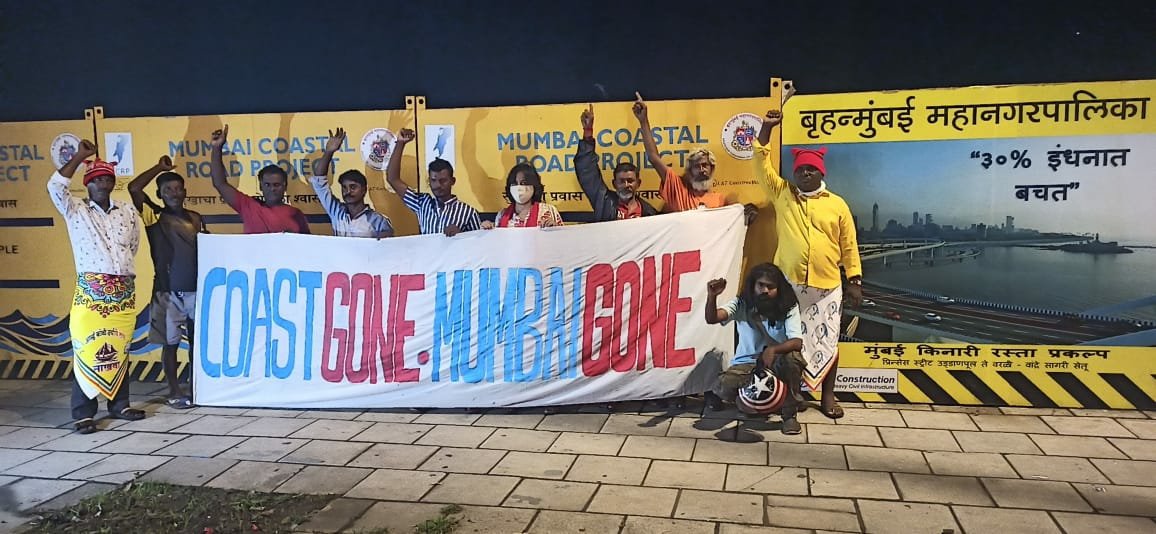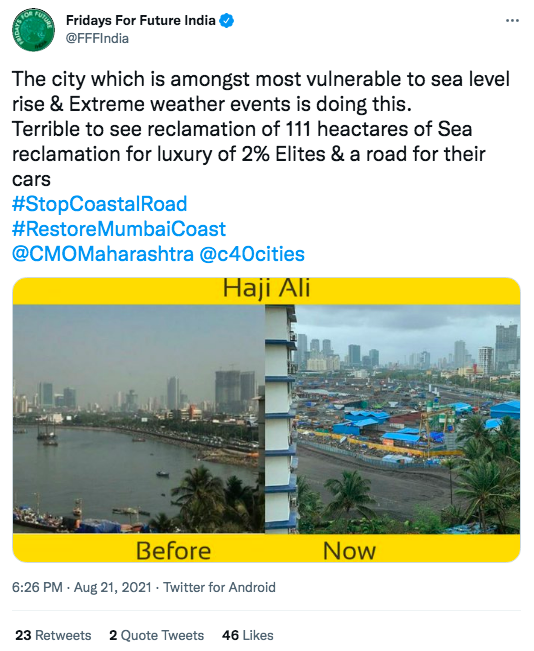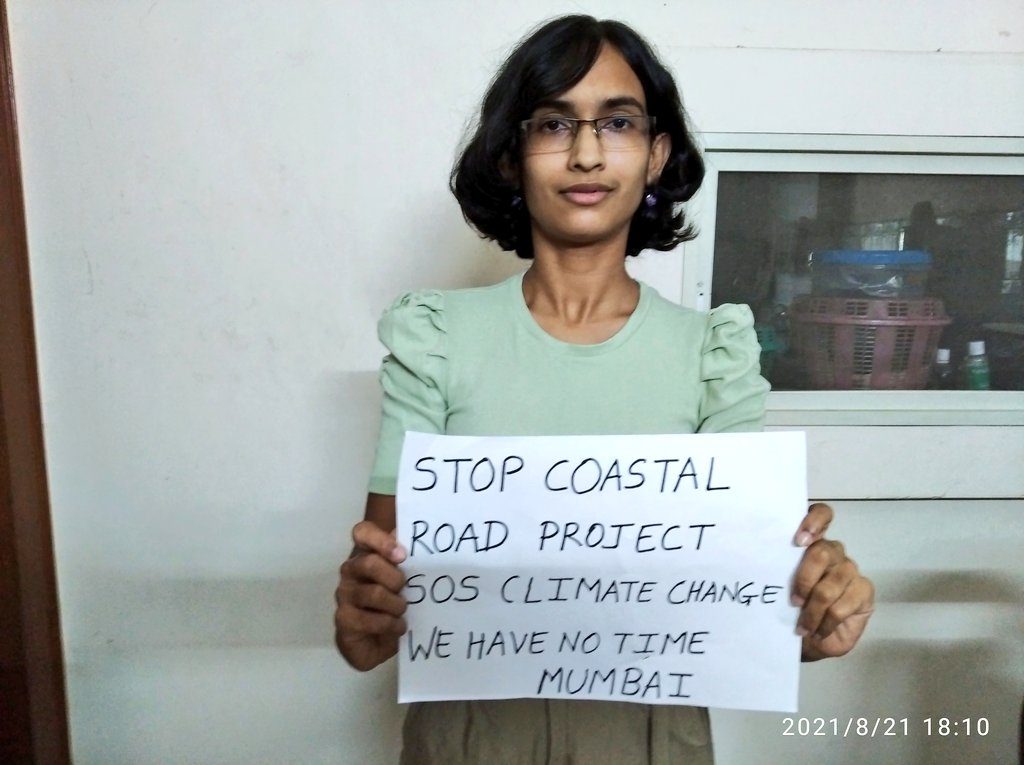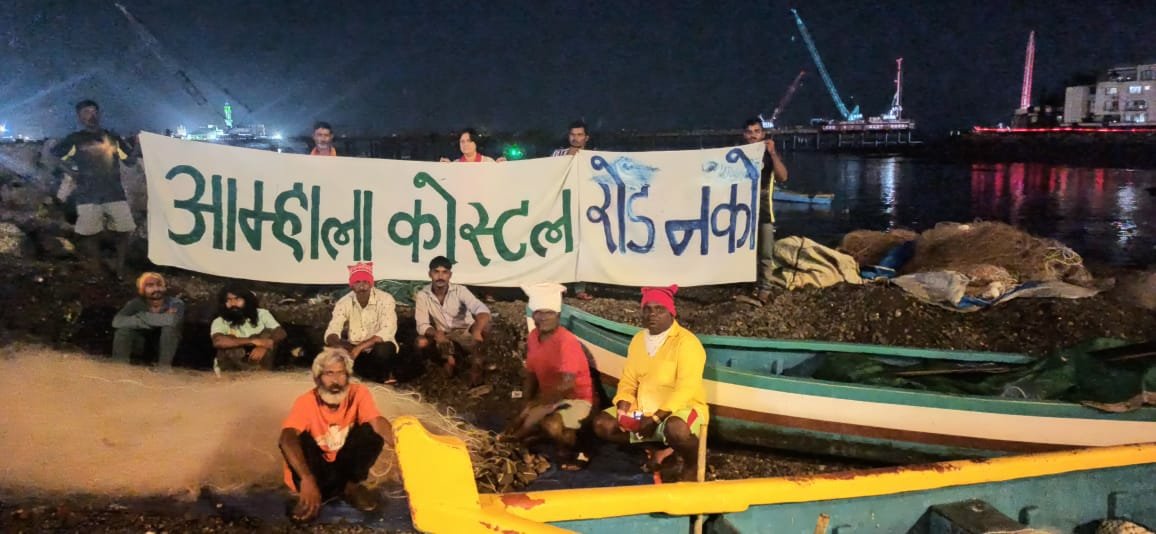
Dispossessed fisherfolk, environmentalists take to social media to protest against major Mumbai project
Protesters in Mumbai. Photo courtesy: Vanchit Macchimar Sahakari Sangathana
Fisherfolk and activists from Fridays for Future India created a tweet storm recently to draw attention to a disastrous new coastal highway that is under construction in South Asia’s main financial and economic center.
Author: Ajay Kamalakaran
Long before Mumbai became the biggest economic and financial centre in South Asia, the Indian city that is an amalgamation of islands was home to a community of fisherfolk called the Kolis. The Kolis have witnessed invasions and colonisation by the Portuguese and the British, with the latter being responsible for reclaiming much of the land in modern-day Mumbai. These original inhabitants now increasingly face dispossession and a complete loss of livelihood because of an ambitious new coastal road that is under construction in Mumbai’s west coast. The project, which costs the Indian taxpayer about $1.75 billion, will essentially push the fishing community into penury. This reclamation of 111 hectares of land from the intertidal zone of the Arabian Sea is destroying the biodiversity and ecology of Mumbai’s coastline. This zone is home to vast amounts of flora and fauna and is a major breeding area for fish.
The Kolis have tried all sorts of traditional peaceful protests, often gathering near the construction sites with environmental activists and holding placards. They have also approached the courts, but unfortunately the Supreme Court of India has allowed the work on the project to continue even as it hears petitions on the extent of land that can be reclaimed.
Tweet storm
Having exhausted several other options, the fisherfolk, who have found common ground with environmentalists, teamed up with Fridays for Future, a youth-led climate strike movement that began with Swedish activist Greta Thunberg, to sit in front of the Swedish parliament. On August 21, 2021, the fisherfolk, under the banner of the Vanchit Macchimar Sahakari Sangathana, a body representing 2,500 fishing families and Fridays for Future India organised a tweet storm with hashtags such as #StopCoastalRoad and #RestoreMumbaiCoast.

Ahead of the tweet storm, the youth group sent a letter to the municipal authorities in Mumbai calling for work to stop on the project and for the constructed segments to be dismantled. “Ruthless work of the Coastal Road project in Mumbai has caused immense harm, in multiple ways, including by unprecedented flooding this year. We oppose the Coastal Road project construction in its entirety,” the youth group said in the letter to municipal authorities. Fridays for Future, India added that a petition on Change.org calling for the project to be stopped had almost 108,000 signatures.
“The principle of public participation holds that those who are affected by a decision have the right to be involved in the decision-making process,” the youth group wrote. “It implies that public opinion will influence the decision, and is an essential part of democratic governance. The principle goes along with the notion of transparency i.e. people have the right to know what the government is doing and it is the government’s duty to make the information available. Both these are missing in the Coastal Road project.”
The sentiments of the youth group have been echoed by Twitter users across India.
In response to a post in the tweet storm by activist Terence Fernandes, an anonymous user of the platform using the handle “Wakeup Mumbai” said, “Policy makers of this suicidal coastal real estate development project will not be living in 2050. Next generation will face miserable consequences due to criminal blunders committed by agents of builders.”
Other Twitter users such as Natasha Pereira pointed out that the coastal road would increase inland flooding and flood the city’s under-construction underground metro line due to exit points being blocked.

The tweet storm generally found support among those supportive of environmental causes and those of marginalised groups, but Twitter activists also received a good degree of abuse from those supporting the project. It has been alleged by several groups critical of Indian government authorities that ‘paid trolls’ are often used to combat dissent in the country. Twitter’s moderators have since managed to delete several of the hateful posts. The project’s paid trolls often ironically claim that the road will help make the commute for a poor person more comfortable and call those opposing the project elitist!
Further activism
A few days after the tweet storm, fishermen’s groups led by the Vanchit Macchimar Sahakari Sangathana staged a peaceful protest (report in Marathi) at the city’s most famous protest venue, Azad Maidan. Fisherfolk from across Mumbai gathered at the ground, the main venue for protests in the city. The protestors managed to reach the venue despite the police trying to block the buses that were ferrying them.

The fisherfolk were also protesting the demolition of a fish market in the busy central area of Dadar in Mumbai.
Sanjay Baikar, a spokesman for the Vanchit Macchimar Sahakari Sangathana told the Free Press Journal that the fishing community has continued to suffer because of climate change. “In the past year, most of our boats and fishing equipment got destroyed as we don’t have any place to park our boats. Cyclone Tauktae too battered our boats severely,” he told the paper.
Even as the fishing community and environmentalists weigh their further options for a peaceful movement to stop this project, the authorities have made it clear that they are aware of the problems that climate change can cause in Mumbai. The city’s municipal commissioner said that a major portion of the city will go under water by 2050. However, the authorities are refusing to abandon the coastal road project. While most of Mumbai was locked down for months in 2020, work on the project continued almost uninterrupted. Money power seems to trump every concern in this vast megapolis.
The graphics, views and opinions expressed in the piece above are solely those of the original author(s) and contributor(s). They do not necessarily represent the views of Centre for Social Change.

Mr. Ajay Kamalakaran is a writer, translator and independent journalist based in Mumbai, India. His main areas of interest are history, languages and environmental causes. He has lived in New York, Mumbai and Moscow, and is the author of three books about Russia. In 2021, he was awarded the Kalpalata Fellowship for History and Heritage Writings.
©2021 Centre for Social Change, Kathmandu
